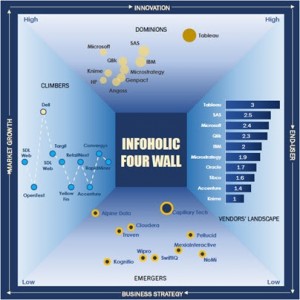Global market expected to reach US$ 80 billion, growing at a CAGR of 26.8% over 2016-2022
Infoholic Four Wall Analysis model, Tableau is placed on the top rung, followed by SAS and Microsoft; ‘Top 10’ global vendors rated on key parameters based on the proprietary “Infoholic Four Wall” model
Infoholic Research LLP, a global ICT market research and consulting organization, recently published a study titled  “Advanced Analytics: Benchmarking the Enterprise Market GrowthVendor and End-User Landscape.” Infoholic Research predicts advanced analytics to be the #1 investment priority for CIOs in the upcoming years. The adoption and usage of advanced analytics solutions will have a major impact on executive decision-making as a result of inferences drawn from the enterprise data silos. As per the study, North America is the leading region in the usage of advanced analytics solutions, followed by Asia-Pacific and Europe. Riding on the back of this wide adoption of advanced analytics solutions across various sectors, the Advanced Analytics market is expected to grow at CAGR of 26.8% for the period of 2016-22.
“Advanced Analytics: Benchmarking the Enterprise Market GrowthVendor and End-User Landscape.” Infoholic Research predicts advanced analytics to be the #1 investment priority for CIOs in the upcoming years. The adoption and usage of advanced analytics solutions will have a major impact on executive decision-making as a result of inferences drawn from the enterprise data silos. As per the study, North America is the leading region in the usage of advanced analytics solutions, followed by Asia-Pacific and Europe. Riding on the back of this wide adoption of advanced analytics solutions across various sectors, the Advanced Analytics market is expected to grow at CAGR of 26.8% for the period of 2016-22.
Analyzing the market by industry vertical, the major share of Advanced Analytics solution offtake is seen from IT & Telecoms (32%), followed by Healthcare and BFSI (21% each). Growth across the verticals has led to the overall growth of the Advanced Analytics market. Just the global BFSI sector demand for analytics solutions is predicted to reach US$ 23.8 Billion by 2022, from US$ 5.1 Billion in 2016, a projected CAGR of 22.6%
K R Sreenivaasan, Founder Director at Infoholic Research said, “The unique geographical region no longer matters in the global market landscape. Even proprietary technologies can be reengineered. What remains is to maximize business through leveraging data and insights. Businesses need answers to what will happen in the future and Advanced Analytics solutions can provide those insights. This seems to reflect in 72.4% of global enterprise users’ displaying a belief in the adoption of Predictive Analytics. By end 2016 the Predictive Analytics market will alone be close to $3 billion.”
As per the Infoholic Research proprietary ‘Four Wall Analysis’ model, Tableau is placed on the top rung, followed by SAS and Microsoft. The Four Wall Analysis model is based on analyzing the performance of various market players on four key parameters – Business Strategy, Market Growth, Innovation, and End-user survey results. The inference drawn from this analysis throws up the relative rating of players under three categories – Emergers, Climbers and Dominions.
Sreenivaasan further added, “At Infoholic Research we have developed a new model named the “Infoholic Four Wall” model. The aim of this model is to provide a robust competitive rating of players in the market through in-depth analysis. We plan to publish four such reports each year to cover key market segments.”
Gaurav Vishal, Lead Author and Senior Analyst at Infoholic Research said, “In the coming years, there will a number of players in the field of Advanced Analytics solutions, bringing in lots of innovation and new challenges. Most of these niche companies will likely be acquired by prominent ones. As per Infoholic Research analysis, the technology or solutions to watch for will be Microsoft’s Cortana Analytics and IBM’s Watson Analytics.”
The report also aims to highlight key insights from End-users along with their pain points. It provides an in-depth analysis and forecast about the industry covering the following key areas:
-
This report not only highlights users’ conundrums (challenges and barriers to adopt advanced analytics), but also brings in their perspective on the Advanced Analytics market. The global market has been analyzed by taking into account the key geographical regions – the American continent, Europe, Asia-Pacific, and Middle East & Africa. The five leading industry verticals covered are BFSI, IT & Telecoms, Healthcare & Lifesciences, Manufacturing & Automotive, and Retail.
-
Analysts have rated ‘Top 10’ vendors vis-a-vis End-user inputs on key factors.
-
Competitive benchmarking analysis to optimize short term and long term strategy of the organizations.
-
Stakeholders’ insights and key market trends (current and future).






